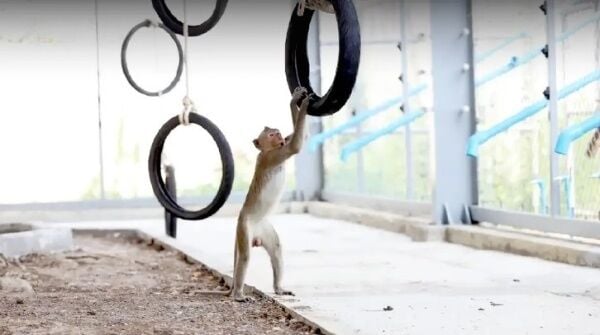27 mischievous macaques relocated to new high-security habitat

To curb the rising menace of aggressive macaques terrorising Lopburi, officials unveiled a new sanctuary at the Pho Khao Ton Monkey Garden. The first 27 macaques were ceremoniously released into their luxurious new home yesterday, May 16, complete with a pool and swinging vines fashioned from motorcycle tyres.
This relocation is the province’s strategic response to the escalating conflicts between humans and macaques, which have included food thefts and attacks that left several residents injured.
The mission was spearheaded by officials from the Department of National Parks, Wildlife and Plant Conservation (DNP), with support from Deputy Governor Songphol Paenkaew and Mueang Lopburi Mayor Jamroen Salacheep.
“The first batch of monkeys, consisting of 24 males and three females, has been spayed, tagged, and thoroughly examined to ensure their fitness for the new environment.”
The monkeys seemed to take to their new habitat enthusiastically, exploring every nook, swimming, and swinging with abandon.
For the next two weeks, officials will closely monitor the monkeys’ health and behaviour, assessing their adaptation to the new surroundings. This pilot phase will also test the resilience of the cage and other critical systems, including feeding protocols, wastewater management, and environmental controls. By the end of the month, another 200 to 300 macaques are slated to join the sanctuary.
Lopburi’s macaques, a longstanding symbol of the province, play a starring role in the annual Monkey Buffet Festival, a major attraction for both locals and tourists, reported The Nation.
The region is home to four macaque variants: the prevalent crab-eating and rhesus macaques, along with the rarer pigtailed and stump-tailed macaques.
ORIGINAL STORY: Second phase of macaque relocation kicks off at historic park
The second phase of relocating macaques from Phra Nakhon Khiri Historical Park to the Huai Sai Wildlife Breeding Centre was initiated yesterday by the Department of National Parks, Wildlife and Plant Conservation (DNP) in Phetchaburi.
The initiative, which involves the placement of cages at 12 locations within the park, commonly known as Khao Wang, aims to capture 205 macaques.
In the first phase of the project, carried out last December, 204 macaques were successfully captured and relocated. A source disclosed that the operation posed challenges due to the intelligence and aggression of the macaques, particularly the leaders of the herds. Nonetheless, all relocated animals are reportedly in good health at the Huai Sai Wildlife Breeding Centre in Cha-am district.
This relocation effort is the result of collaboration between the DNP and the local civil network in the province, to mitigate conflicts between the monkeys and the local population. It is seen as a potential model for other provinces facing similar challenges.
Among those present at the launch were Yuthapol Angkinan, adviser to the Minister of Social Development and Human Security; Atthapol Charoenchansa, DNP director-general; and Edwin Wiek, secretary-general of the Wildlife Friends Foundation Thailand.
Official records indicate that the park was initially home to more than 1,000 macaques. Residents had voiced concerns about the animals’ aggressive behaviour towards people in Mueang district. The Thai authorities noted a rapid growth in the macaque population in the park, which surged from around 9,500 in April last year to 12,000 by June, reported Bangkok Post.
Latest Thailand News
Follow The Thaiger on Google News:


























